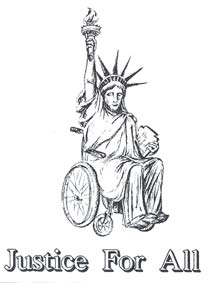
Graphic by Jenna Turner
|
The year 2000 marked the tenth anniversary of the signing of the Americans with Disabilities Act (ADA) by President George Bush. The ADA is an historic piece of legislation-- it protects the civil rights of people with disabilities and is modeled after earlier landmark laws prohbiting discrimination on the basis of race and gender. The law prohibits discrimination in employment, transportation, and public accommodations against America's largest minority-- the 54 million Americans with disabilities.
In hearings before the U.S. Senate (May 9, 1989) prior to passage of the ADA, Senator Edward M. Kennedy stated--
The Americans with Disabilites Act will end this American Apartheid. It will roll back the unthinking and unacceptable practice by which disabled Americans today are segregated, excluded, and fenced of from fair participation in our society by mindless, biased attitudes and senseless physical barriers.
On this, the tenth anniversary of the ADA, the National Organization on Disability (NOD) released the 2000 NOD/Harris Survey of Americans with Disabilities. While the survey reveals the level of life satisfaction among indivi8duals with disabilties decreased slightly compared to individuals without disabilities, the survey also revelaed encouraging progress in and among those with less severe disabilities. Overall, 63% of individuals with disabilities believe that life has improved over the past decade.
A report by the National Council on Disability has concluded that compliance with the ADA still remains problematic. Unlike previous civil rights laws, the ADA relies too heavily on voluntary compliance as compared to government enforcement (Promises to Keep: A Decade of Federal Enforcement of the Americans with Disabilities Act, June 27, 2000).
Most recently, the ADA has gained national attention in a showdown between Clint Eastwood and trial lawyers. In testimony before a congressional hearing (May 18, 2000), Eastwood accused lawyers of suing hundreds of small-business owners for failure to comply quickly enough with the ADA. However, only a few states have building standards certified by the U.S. Justice Department as ADA compliant. As a result, businesses are frequently granted building and occpuancy permits not meeting federal ADA standards.
Unlike previous civil rights legislation, the ADA has its Achilles heel. The federal government, throught the Department of Justice, has initiated only a limited number of lawsuits.
Instead of major litigation, it has pursued a strategy of education, persuasion, and mediation.
Given discrepancies associated with implementing the ADA nationwide, a plethora of suits by private law firms has been filed. For example, the Miami Beach law firm of Fuller, Mallah and Associates, with a nonprofit group called Advocates for the Disabled, files approximately 200 lawsuits in an 18-month period. It has won $340,000 in fees, but none of the money was awarded to individuals with disabilities on behalf of whom the suits were filed (Forbes, March 20, 2000).
In an effort to stem the recent flood of lawsuits, Florida congressment Clay Shaw and Mark Foley have introduced the ADA Notificaiton Act (H.R. 3590, February 8, 2000). The Act would amend Title III of the ADA (Public Accommodations and Commerical Facilities) and require plaintiffs to give businesses notice of alleged violations and a 90-day notice to make necessary corrections (if violations exist) before being subject to a lawsuit. In a statement before the House Constitutions Subcommittee, Clay Shaw, who voted for the ADA in 1990, stated "...what these lawyers are doing in the name of the ADA is wrong, and if it continues, I fear that support of this important law will begin to decline" (May 18, 2000).
Advocates for individuals with disabilities loathe the idea of revisiting the ADA. They fear that once they do, lawmakers will try to chip away at their wall of protection. Anthony Brady, a New Jersey lawyer, opposes the Shaw?Foley bill "because it would provide large corporations the same 90-day protection" afforded small-business owners. "Escalating legal fees," he says, "is the only weapon the disabled have to force big companies to accommodate them" (The Wall Street Journal, May 9, 2000).
In a short period of ten years, the ADA has made great strides in achieving protection from discrimination and prejudice for individuals with disabilities. However, has society advanced sufficiently enough to allow Congess to revisit the law to propose and possibly negotiate changes? Would changing the ADA in any manner reinforce the nation's former perception of individuals with disabilities as charity cases instead of a population entitled to inalienable civil right?